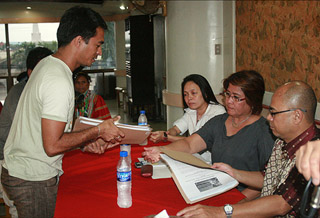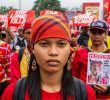One of the lawyers whose name was on the list, Carlos Isagani Zarate pointed out the �dangerous� conclusion at the end of the presentation. Branding those on the watchlist as �enemies of the state� makes activists �legitimate� targets for attacks, said Zarate, who, along with three other lawyers on the list, had filed a petition for the writ of amparo to clear their names and to protect their lives. Zarate�s petition said the inclusion of his name was �not only malicious, but was also calculated to harass and instill fear.�
�First, they vilify individuals and demonize them to justify the liquidation,� said Carlos Conde, the only journalist included in the list. �I consider this as a threat,� he said. �But it�s not only the media that are being targeted but people who are critical of the government, especially peasants and activists.�
The NUJP, where he used to sit as secretary-general, worried over the safety of its 700 members nationwide because of the group�s inclusion in the list.
As early as 2007, UN Rapporteur on extrajudicial killings Philip Alston had urged the government to stop the military from issuing statements that tag activists and militant groups as �Communist fronts� because these statements seem to justify the killings.
After all, Congress had repealed the Anti-Subversion Act in 1992, so that membership in the Communist Party of the Philippines is no longer illegal. Even the partylist system�established by Congress in 1995�has allowed wider participation in the country�s democratic political system.
�Characterizing such Congressional (partylist) representatives and much of civil society as �enemies� is thus, completely, inappropriate,� Alston wrote in his report after his mission to the Philippines in the early part of 2007. �Not surprisingly, they�ve led to abuses.�

Karapatan-Davao presents the findings of the international solidarity missions to Compostela, New Bataan, Diwalwal, Paquibato, Sta. Cruz and Tampakan (South Cotabato) to Human Rights Chair Leila de Lima. The reports include the controversial order of battle (OB) list targeting members of progressive groups, including doctors, lawyers and a former Davao-based journalist. (davaotoday.com photo by Barry Ohaylan)
Alston pointed out that this public vilification of �enemies� (of the state) is accompanied by �operational measures,� of which, the �order of battle� approach, is an example.
He defined the order of battle as a military term for an �organizational tool used by the military intelligence to list and analyze enemy military units.� A copy of a 2006 document was leaked to him during his visit, �co-signed� by a senior military official, calling upon the intelligence community in the region to �adopt and be guided by this update to enhance a more comprehensive effort against the CPP/NPA/NDF.�
The document listed hundreds of civil society groups.
�When political �warfare� is conducted by soldiers rather than civilians, democracy has been superseded by the military,� Alston said in his report.
AT LEAST three people whose names and groups were on the list, were killed in the last two years. The picture of Pojas, killed on May 15 last year, appeared in one of the slides of the presentation. Ludenio Monzon, the lumad activist killed in Davao Oriental in April this year, belonged to the Mandaya group Negkahiusa Koy Mag-uuma To Boston (United Farmers of Boston), an affiliate of the Alyansa ng Mag-uuma sa Sidlakang Dabaw (Almasid), a group which appeared on the list.
So was Dr. Rogelio Pe�era, an epidemiologist of the Department of Health (DoH), who was also a member of the Board of the United Integrated Health Services Foundation Incorporated (UIHSFI) and a council member of the Bagong Alyansang Makabayan (Bayan), two groups on the list.
Nonoy Espina, vice chair of the NUJP, another group on the list, said Congress should exercise its oversight power to find out how intelligence funds are used. �The military has money to deal with the enemies of the state but if these are only used to spy on civilians, there ought to be an oversight mechanism to curb this practice.�
The lawyers filed the writ of amparo, seeking to clear their names while stressing their need for protection. �At the same time, we want to confront the AFP about the OB existence,� Zarate said. �Through the amparo, the court can also order the production of documents in question and their destruction, if needed.�
�It�s their right to file for writ of amparo,� said Mapagu, even as he called Ocampo�s claim of the �hit list� as �preposterous.� �There is no such thing as a hit list,� he said. �It�s Ocampo�s concoction.�
But on the day of the hearing the military officials in question did not show up in court, further raising fears that killing of activists in the region is not yet about to end. (To be concluded)
Extrajudicial Killings









